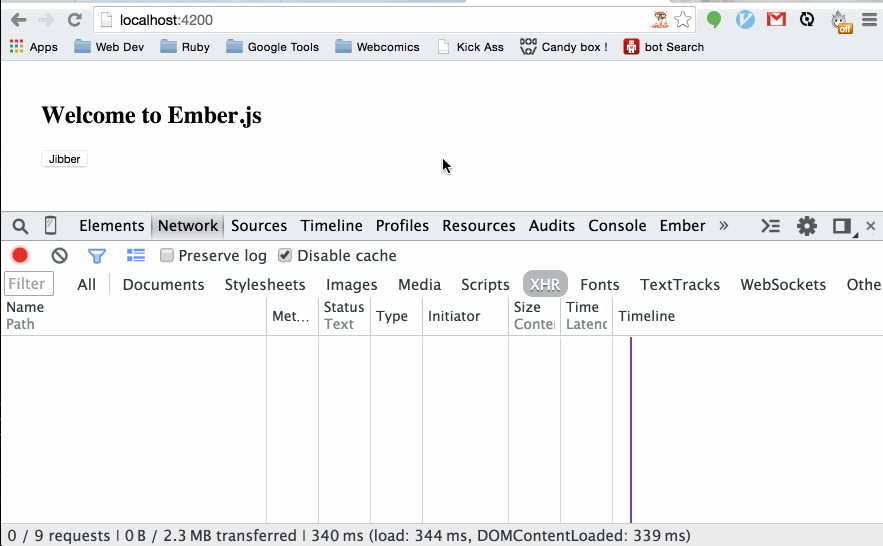EmberCLI, Torii and Rails
07 Dec 2014
This is the second part to my previous post.
Rails
When we left off we had a ember app setup on divshot to talk to a rails application for authentication via github. We’ll start by generating a new rails app:
rails new jibber
cd jibber
bundle
The first thing we’ll want to do is create the route that our ember application is posting the github temporary token to:
# config/routes.rb
Rails.application.routes.draw do
namespace :v1 do
resources :sessions, only: [:create]
end
end
Then we’ll make our sessions controller:
# app/controller/v1/sessions_controller.rb
module V1
class SessionsController < ApplicationController
skip_before_action :verify_authenticity_token
def create
github_authenticator = GithubAuthenticator.new(github_auth_code)
user_factory = UserFactory.new(github_authenticator)
user = user_factory.find_or_create_user
render json: user, status: :created
end
private
def github_auth_code
params.require(:'github-auth-code')
end
end
end
We have to skip the verify_authenticity_token before_action which is used to ensure requests are coming from the same origin. As our ember application will be on a different domain than our rails application, we need this check to be skipped.
The create action is a great example of writing code I wish I had. The first
line creates a new instance of the GithubAuthenticator class. This class
should be passed the github auth token. The second line passes the instance of
GithubAuthenticator to instantiate another class that doesn’t yet exist, the
UserFactory. We then call find_or_create_user on the user_factory, which
should return a user, and pass the result to be rendered as json with a status
of :created. We always pass :created as the status as we’re letting the
browser know that a new session, not a user, has been created.
Let’s go ahead and make the UserFactory class so we can spec out what the
GithubAuthenticator needs to provide:
# app/services/user_factory.rb
class UserFactory
def initialize(authenticator)
@authenticator = authenticator
end
def find_or_create_user
User.find_or_create_by(name: authenticator.name)
end
private
attr_reader :authenticator
end
So we pass an authenticator to the UserFactory’s initialize. The
find_or_create_user then finds or creates the user using a name provided by
the authenticator. There’s nothing here specific to github, so adding extra
sign in services is just a case of creating other authenticator classes that
implement a name method.
Now let’s look at the GithubAuthenticator class:
# app/services/github_authenticator.rb
require "net/http"
require "net/https"
class GithubAuthenticator
GITHUB_OAUTH_PATH = "https://github.com/login/oauth/access_token"
def initialize(auth_code)
@auth_code = auth_code
end
def name
github_user[:login]
end
private
def github_user
@github_user ||= github_client.user
end
def github_client
Octokit::Client.new(access_token: access_token)
end
def access_token
github_response["access_token"]
end
def token_type
github_response["token_type"]
end
def scope
github_response["scope"]
end
def github_response
@github_response ||= JSON.parse(res.body)
end
def res
http.request(req)
end
def req
req = Net::HTTP::Post.new(uri.path)
req.set_form_data(post_data)
req["Accept"] = "application/json"
req
end
def http
http = Net::HTTP.new(uri.host, uri.port)
http.use_ssl = true
http
end
def uri
URI.parse(GITHUB_OAUTH_PATH)
end
def post_data
{
"client_id" => ENV["GITHUB_KEY"],
"client_secret" => ENV["GITHUB_SECRET"],
"code" => @auth_code
}
end
end
This class is pretty long, and I’d consider extracting a class to handle the
oauth post to github. I won’t go over every line, as I hope the code is clear,
but here’s an overview. We initialize with the temporary token provided by
github and make a Net::HTTP request following the guidelines provided by
github. This returns an oauth token. We
use Octokit to request the user from
github and extract the :login for our name method.
We’ll need to add gem "octokit" to our gemfile and run bundle. I also use
dotenv to manage environment variables in development so go ahead and add
that to dev and test and put your github authentication details into .env:
# .env
GITHUB_KEY=github_develoment_key
GITHUB_SECRET=github_development_secret
Finally we’ll want to create a User model and a migration:
# app/models/user.rb
class User < ActiveRecord::Base
validates :name, presence: true, uniqueness: true
before_create :generate_token
protected
def generate_token
self.token = loop do
random_token = SecureRandom.urlsafe_base64(nil, false)
break random_token unless User.exists?(token: random_token)
end
end
end
# db/migrate/20141204213638_create_user.rb
class CreateUser < ActiveRecord::Migration
def change
create_table :users do |t|
t.string :name
t.string :token
t.timestamps
end
end
end
The user class is simple enough, we generate a unique token on create that the ember app can use for retrieving a session.
Now if we have everything wired up correctly, with our rails app running:
rails s -p9000
and our ember-cli app running:
ember s --proxy=http://localhost:9000
we should be able to visit localhost:4200 and click on our login button. We then see our success alert and can see in the console the rails app returning our user:

Now lets get this up on heroku.
Heroku
Get yourself an account on heroku and install the toolbelt with brew install
heroku-toolbelt. Once you’re setup, go ahead and create your heroku app. You’ll
then want to commit all our changes to git (if you haven’t already) and push
your code up to heroku:
heroku create jibber-rails
git add -A .
git commit
git push heroku master
heroku run rake db:migrate
We’ll also want to set our two environment variables for github credentials:
heroku config:set GITHUB_KEY=github_production_key GITHUB_SECRET=github_production_secret
That gets us the same functionality in production!
Up Next
Next time we’ll setup creating a session on the ember side and allowing the ember app to retrieve the session using the user’s token.